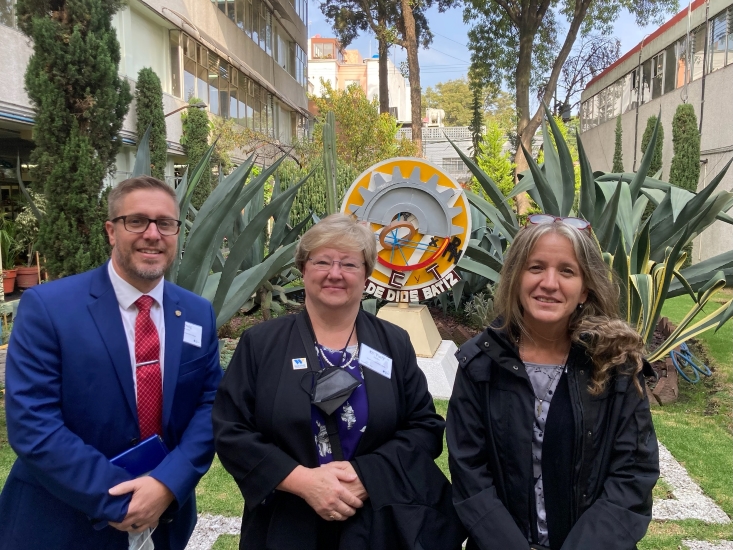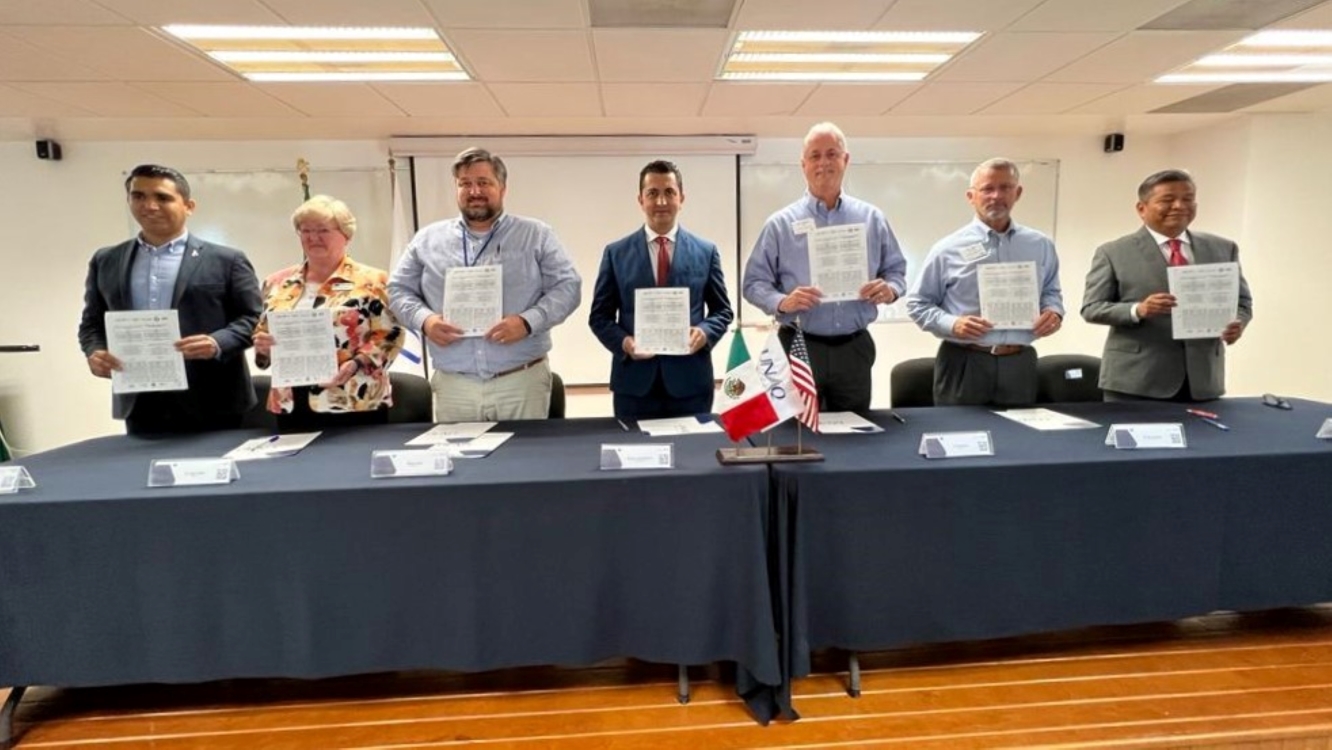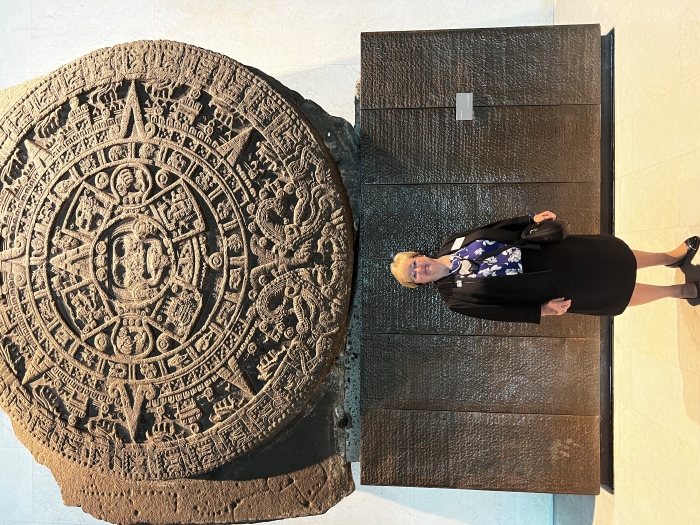A trip to Mexico by four Wayne County residents will lead to cooperation with institutions in that country and innovation in working with the Latino population in this one.
Through Go Global NC’s Latino Initiative: Strengthening the Talent Pipeline, three from Wayne Community College – President Patricia Pfeiffer, English Language Acquisition Coordinator Maria Abalo-Zarate, and Executive Director of the Wayne Business and industry Center Craig Foucht – and Esteban Guzman, a foreign legal consultant in North Carolina and Mexico, spent a week in an immersive learning experience in Mexico.
Also on the trip were representatives of James Sprunt Community College, Lenoir Community College, Sampson Community College, the North Carolina Community College System, and other higher education organizations; kindergarten through 12th grade officials; government leaders; and industry executives.
In late October, the two dozen participants visited landmarks, museums, community centers, and educational institutions; attended cultural events; enjoyed traditional foods; met with leaders from the Mexican federal government, the State of Queretaro, and local communities; heard from leaders of industries, workforce programs, and nonprofit organizations; and learned about the history of the region they were visiting.
The stated purpose of the program is to “strengthen North Carolina’s talent pipeline and reduce the skills gap through an increased understanding of the Latino community in North Carolina.”
Other goals were to
* learn how Mexican industry operates and contributes to its overall economic development;
* develop innovative approaches, tailored to a North Carolina community’s specific needs and opportunities;
* acquire an appreciation of cultural attitudes, values, and behaviors that are important for understanding best practices and applied learnings for working with the Latino population; and
* join a professional network of leaders and diverse stakeholders who are working across professional disciplines to improve economic and workforce development in their communities.

Noting that “North Carolina has one of the fastest growing Latino populations of any state, and most of the state’s newest residents are from Mexico,” the initiative’s materials state that it provides leaders with “resources and information to create practical, insightful solutions that incorporate a better understanding of Latino/Hispanic cultures into our state.”
“It was a very meaningful opportunity to not only realize how hard working and dedicated the people of Mexico are and how rich the culture is, but how we can work together to embrace the opportunities we have for them in this country,” said Dr. Pfeiffer.
Dr. Pfeiffer was particularly struck by how “almost all high schools are teaching for industries, vo tech style [vocations and technical education and training].”
“We are interested in post-secondary attainment, understanding some of the barriers some of them face, being able to appreciate what is important to them and show our appreciation for them,” Dr. Pfeiffer said.
“It was an eye opener for me. I saw it through the eyes of all the others who were with me,” said Guzman, who is a native of Mexico. “I enjoyed their mindshift from the idea they had to the reality of the people, particularly the youth and culture.”
“We learned a lot about Mexico,” said Guzman. “We discovered things that unite us as a bigger culture.”
“We learned it from real people, we didn’t receive it from a government person who told us what they wanted us to know,” Guzzman said.

“Different from tourists, they had the chance to talk to people, see the culture. We saw Mexico City in all its splendor. We went into the rural areas.”
“We got a lot of ideas, a bunch of fabulous things that can be done,” Guzzman said.
A few of Guzzman’s observations in the academic settings were
* the large proportion of females in the technical careers,
* the way students were engaged in their classes and with each other, particularly how few cell phones he saw among them;
* that most people spoke English to the group and even students were not afraid to try;
and
* the effort students put into learning there versus the entitlement of students here.
Abalo-Zarate, a native of Argentina, also found the trip to be very revealing.
“Despite working with Mexican students and students from other countries for 15 years, on this trip I experienced and understood their culture even more.,” Abalo-Zarate said.
“It is their pride in being Mexicans that moves them and unites them as citizens to always see the best for their community. Their efforts to involve the government as well as large industries in the education of the people are bearing fruit. They have a sense of community well-being rather than individual well-being.”
In Mexico, Abalo-Zarate said, “some educational institutions subsidized by the state or by the federal government have very few resources. But it is those very needs that motivate them to go out and find solutions and accept used equipment that helps students to get into technological knowledge. … We are doing good here in Wayne county, but we need to do more.”
“It was an eye opener to what we, as educators, are doing with our youth and children. Pay more attention to their needs and work on them to help them build a future.”
After individual reflection, Dr. Pfeiffer said, “The four in Wayne County’s travel team will meet and see where we go from here.”
WCC will also meet with the other community colleges that participated. “We are looking forward to working with our sister colleges on efforts to impact our Latino populations.”

In particular, they will revisit the memorandum of understanding the four community colleges signed with six Mexican educational institutions: Universidad Politécnica de Santa Rosa Jáuregui, Universidad Tecnológica de Querétaro, Universidad Tecnológica de Corregidora, Universidad Politécnica de San Juan del Río,and Universidad Aeronáutica en Querétaro.
The three-year agreement is to “explore educational and scientific cooperation efforts” possibly including visiting academic staff, visiting students, and cooperation research.”
Dr. Pfeiffer said that the State of Querétaro has already reserved enough money to exchange 100 of its students for study abroad.
“We will explore ways to cooperate, maybe to host or exchange staff and students or research,” Dr. Pfeiffer said. “This is a first step.”
After the experience in Mexico, Go Global NC intends to lead workshops at one, three, and six months and one year after travel so that participants can create a platform for collaboration and networking to apply what they gleaned from the trip.
This is the second time that Wayne Community College personnel have participated in the program. In 2007, History Instructor Tracey Ivey and English as a Second Language Director Karen Burnette, both now retired, spent 10 days in Mexico with the Center for International Understanding, which is now Go Global NC.
Burnette said that they visited many of the same places and also found the experience valuable. The lessons they learned were used to improve WCC’s English as a Second Language program and enhance its Global Education efforts.
About Go Global NC
Go Global NC, founded in 1979, designs and manages programs that build the capacity of policy leaders, educators, students, and business and community leaders to enable North Carolina to succeed in a global economy and increasingly interdependent world.
Since 1998, the organization’s Latino Initiative has provided year-long professional development programs to North Carolina business, community, education, and policy leaders. This year’s program was made possible with support from Anonymous Trust, John M. Belk Endowment, Smithfield Foods, and the Z. Smith Reynolds Foundation.
Visit goglobalnc.org to learn how Go Global Nc connects North Carolina and the world.
About Wayne Community College
Wayne Community College is a public, learning-centered institution with an open-door admission policy located in Goldsboro, N.C. As it works to develop a highly skilled and competitive workforce, the college serves 10,000 individuals annually as well as businesses, industry, and community organizations with high quality, affordable, accessible learning opportunities, including more than 165 college credit programs. WCC’s mission is to meet the educational, training, and cultural needs of the communities it serves.

